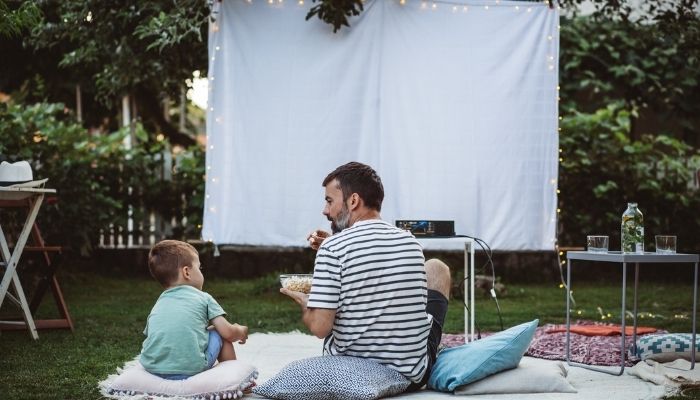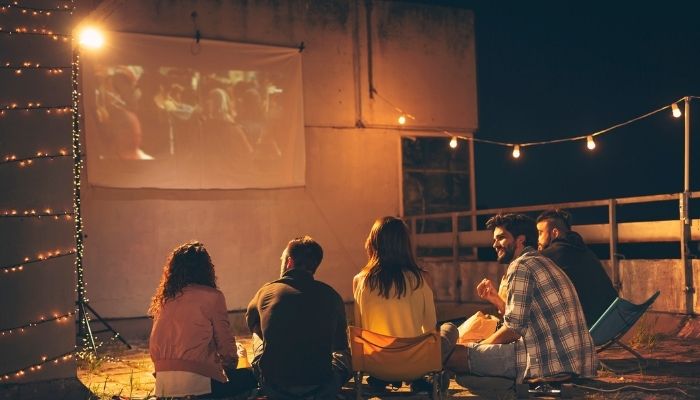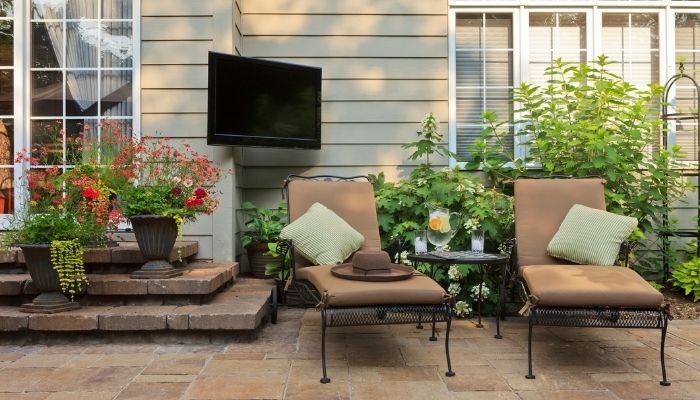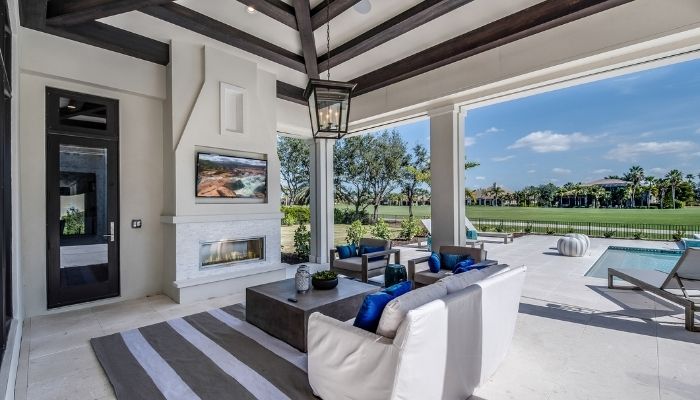So you’re looking for a way to get some screen time outside. As far as setups go, you have a few options. You can use an outdoor TV or a projector. Both have their own advantages and drawbacks.
And while personal choice has a fair impact on the option to go with, which device is the better way to go? We’ll help you decide which device is right for you, your home, and your entertainment.
When Size Matters
One of the easiest ways to ruin a good outside movie is by having a screen that’s too small to see properly. Although TVs get bigger and bigger with each newer model — the fact remains that to really get a big-screen experience, you’re going to want a projector.

Most TVs do not surpass 85 inches, while a projector can reach a screen size of 300 inches. If you’re planning an outside movie night or viewing party, a projector screen with a larger screen will be necessary so that everyone can comfortably see the image at a reasonable distance. However, if you just want a screen to watch the game and the occasional TV show outside, a TV will definitely do.
What’s With The Light?
When it comes to outdoor screening parties, light is a key factor in determining whether a TV or projector is necessary. A projected movie requires the absence of most, if not all, external light. In the spring and summer, when it may not become dark until late in the day, watching a projected movie may be troublesome. So, if you want to show a movie outside before sunset, you’ll need to utilize an outdoor TV. As long as the sun isn’t shining directly on the TV, the picture should be pretty simple to see.
However, if your surroundings are really dark, such as in a more rural area, or you only want to show a movie after the sunset, a projector is ideal over an outdoor TV. The light from the projector is softer and gentler on the eyes, whereas a bright TV in complete darkness has been linked to headaches and tired eyes.

Get Some Space
You should also consider your surroundings when picking between a projector and television. If your yard is extremely forested, you might not be able to project through it. Do you have a place near your pool where you can put up a projector or TV without the risk of water and electricity colliding? A projector setup may also not be practical if you have a tiny or congested yard.
Now projectors themselves don’t take up much room. The screens can be packed away, and the projection unit is typically small. So to decide on how much space you need, you need to know the distance between the projection surface and the projector, otherwise known as the throw distance, to achieve the best and largest picture.

Many projectors, especially the less expensive ones, require a distance of 10 to16 feet; just make sure there isn’t a lot of foliage or tree limbs in the way. And if you don’t have much space in your backyard, search for projectors that can be placed considerably closer to the screen. As for TVs, you need to consider the viewing distance. When you cram a large TV screen into a small or overcrowded area, you’ll be forced to sit closer, which will affect how you see visual details.
Pro tip: It’s smart to measure the space you’ll be projecting onto before purchasing a projection screen. Alternatively, if you decide to go with a TV, make sure there’s enough space to safely mount it.
How’s The Weather?
The weather is perhaps the most significant problem for those who want an outdoor home theater. We know water and electronics don’t mix well, but what about the summer season? Both projectors and televisions should work great as long as the temperature is suitable.
Thankfully, many TV manufacturers have designed outdoor TVs to withstand sun exposure and are normally enclosed in a protective shell. But if you have an extra TV that isn’t outdoor-proof, you can use a separate element-proof case that can be opened when you want to use it or has a glass front so you can still see the screen.
Projectors do bring with them some weather-related concerns. Unlike televisions, there aren’t many projectors designed for outdoor use. Instead, if you want to use a projector, you’ll have to store it indoors when you’re not using it and set it up outside when you do. That is why projectors may be better suited to occasional use, such as a movie night with friends, rather than a permanent feature in your entertainment space.

Pro tip: Both TV and projectors need to be stored in the optimal temp conditions found in the operating manual. If you live in really cold temps or an area that faces extreme heat, check the specifics of the product before you decide.
Can You Hear It?
Nearly every TV comes with built-in speakers, and they’re typically all you need unless you want to upgrade your home theater with a surround sound system, soundbar, or an integrated outdoor audio system.
Many projectors also have built-in speakers, but they’re usually not the strongest. So if you plan on entertaining, you may have to support the audio with another speaker or integrated sound system so that the sound can be easily heard.
The Final Decision
Now it’s up to you! Outdoor TVs and projectors serve different purposes, but you should choose the device that can work best with your lifestyle and backyard setup. And if you’re ready to make your purchase, check out our selection of outdoor TVs and projectors!
If you still find yourself with questions or are unsure, the experts at Toton’s TV are here to help. Just give us a call or visit our store today!